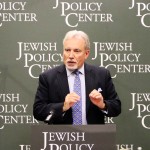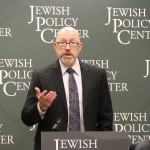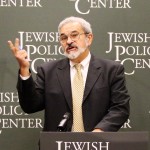Dr. Daniel Goure of the Lexington Institute, Dr. Dakota L. Wood of the Heritage Foundation and Paul Joyal of National Strategies discussed the requirements of a sound American defense policy at a program sponsored by the JPC.
On the subject of American leadership, Dr. Goure pointed to the current international system of trade and security and noted that the U.S. is uniquely able to manage the system so that it protects Western interests. “We tend to think that, even if we were not leading, somehow things would more or less run as they run now. That is not true. There is no other system that would safeguard our interests like this one,” he said. “A system led by the Chinese might more closely resemble 1984.” In sum, “Europe will not lead; China cannot lead; and Russia must not lead.”
Dr. Wood noted that, “Capacity – having a sufficiently large force- is an enduring, critical reality of conflict and securing U.S. interests. This should drive discussion about defense spending.” In the Cold War period, the U.S. spent roughly $1.3 trillion annually – 7% of GDP. In the last 40 years – the period of the collapse of communism and the rise of Islamic fundamentalism – the U.S. spend an average of 4.5% of GDP, or $775 billion annually; and now we spend 3.2% of GDP, or $505 billion. He postulated that 5% of GDP could permit investments in all of the services that could help bring them closer to ready for their main mission – “to make it possible for the U.S. to physically impose its will on an enemy when necessary.”
Mr. Joyal, speaking of Russian cyber capabilities, said the Russians are graduating hundreds of thousands of technically trained people while the U.S. has a deficit in trained manpower. At the same time, the Russians have thought through how to us cyber capabilities to pursue its interests against the United States rather than investing in tanks and planes. “Cyber warfare is a force multiplier. The Russians are not doing ‘force on force simulations’ against the U.S.; they are doing ‘system on system’ simulations. The U.S. is making progress,” he said, “but not at the pace the threat demands.” Mr. Joyal advocated creation of a “Cyber Reserve Force” that could take advantage of the skills of Americans in the civilian market without making them members of the military.
The program, an offshoot of the Winter issue of inFOCUS Magazine, was deemed “enlightening,” for the expertise of the speakers, though not “uplifting,” a nod to the fairly grim set of circumstances the United States faces in exercising leadership abroad.





